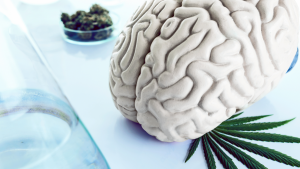Mental Health and Medical Cannabis: Exploring the Relationship
Mental illness comes in various forms. There are many different diagnoses for mental illness, ranging from Anxiety, Depression, PTSD, and for some, personality disorders like Borderline Personality Disorder or Obsessive Compulsive Personality Disorders. These diagnoses can manifest in different behaviors or levels of severity for people, making finding the right treatment path difficult. In short, there is no “one size fits all” for achieving balanced mental health, and is often a long journey with a variety of integrated approaches.
Compassionate Clinics of America recognizes that many turn to cannabis for anxiety, and wonder whether using cannabis for depression is an effective method of treatment. Here we will discuss some issues regarding mental health, mental illness, and the role of cannabis medicine in maintaining emotional and mental well-being.
Prevalence of Mental Health Issues in America
It can’t be denied that almost three years into a global pandemic, we are experiencing a mental health crisis, and seeing the effects of this time on all ages and backgrounds.

According to Mental Health America, in 2022, 19.86% of adults in America, or 50 million Americans are experiencing a mental illness. This figure does not account for youth. 7.74% experienced substance use disorder in 2022, and 4.58% experienced serious suicidal thoughts this year, over 600K more than last year. 11% of people experiencing mental illness do not have medical insurance, yet 56% of those with mental illness never seek treatment.
Despite mental illness being so prevalent within our country, states, and communities, people often feel alone, scared to disclose their feelings to others, or simply don’t know where to turn for mental health support. Compassionate Clinics of America, through helping people explore medical cannabis through education and medical cannabis certification is a resource for so many across Arizona, Arkansas, California, Connecticut, Delaware, Georgia, Illinois, Iowa, Louisiana, Maine, Maryland, Massachusetts, Michigan, Minnesota, Missouri, Montana, Nevada, New Jersey, New York, Ohio, Oklahoma, Pennsylvania, Texas, Utah, Vermont, Virginia, & West Virginia, who are experiencing concerns with their mental health. Here we’ll explore some common mental health issues and how cannabis medicine may be of help.
“I Just Feel So Anxious!”: Medical Cannabis for Anxiety
Anxiety, as defined by The American Psychological Association, is an emotion characterized by feelings of tension, worried thoughts, and physical changes like increased blood pressure. This also includes feelings of restlessness, being “on edge”, or feeling uncontrollably worried or irritable. Some report difficulty concentrating or problems with sleep.

While millions of people turn to medical marijuana for anxiety, few may know that CBD may actually provide more benefit than the intoxicating cannabinoid THC. One study that consolidated the data on studies involving humans showed consistent anxiogenic effects (causes anxiety) from THC, while CBD shows a consistent anxiolytic effect (bringing a sense of calm). It is believed that the effect of CBD on anxiety involves the CB1 receptor within the endocannabinoid system, our serotonin receptors, and other brain receptors that regulate fear and anxiety-induced behaviors.
One study administered CBD to participants when they were exposed to specific things that brought them fear. It was observed that after using CBD, fear-based responses were notably diminished or extinguished, opening the door for the potential of CBD to help PTSD (Post Traumatic Stress Disorder) and phobias.
Another study placed 24 participants with social anxiety disorder in public speaking situations, observing that CBD helped reduce anxiety, cognitive impairment, and discomfort in speech performance.
If you have received your medical cannabis certification, and are looking to medical cannabis to help reduce anxiety, we encourage you to seek out cannabis products and cultivars (strains) that are higher in CBD than THC.
More Than Just “The Blues”: Marijuana for Depression
Depression is a common mental health issue, and we see an increase in people experiencing depression when the weather changes to cold, or around holidays. Many have situational depression, based on a life event, but for many, depression is an everyday reality. Depression is more than just feeling “blue”, which is natural with life’s ups and downs and can extend into all aspects of one’s life and persist for a long time.
When it comes to understanding medical cannabis and depression, the jury is still out as to whether it is effective. There have been numerous studies that have participants self-report the effect that cannabis has on their depression. A 2017 survey of almost 1500 medical cannabis users determined that over half are using cannabis for depression. In general, most respondents indicated that medical cannabis helped, often saying that just a small amount of inhaled cannabis can greatly relieve the dark and negative thoughts that come with being in a depressed state.

Another study reviewed nine studies on medical marijuana and depression, seven of which indicated that depression symptoms have greatly improved, yet there have not been any studies that observe the effect of medical marijuana on depression symptoms over a long period of time.
Similarly, in the 1960s, researchers tried to determine that cannabis leads to a lack of motivation (anti motivational syndrome), yet to date, there have been no official links that determine that using cannabis either adds to, or detracts from, a sense of motivation (so you can tell people that there is no proof that cannabis makes you “lazy”!).
However, it is speculated among health care professionals that for some, depression symptoms can worsen if a patient engages in over-use, for which a tolerance break may be of benefit.
Medical Cannabis for Other Mental Health Issues
Mental health is an under-studied area of medicine, and we are just beginning to see more research come out on how marijuana affects, or even relieves symptoms of mental health struggles or mental illnesses.
More studies are examining cannabis and anxiety, depression, PTSD, and mental issues like ADHD, among other common mental health issues. More studies are also emerging on how cannabis impacts other conditions of the brain, including Schizophrenia, Alzheimer’s and dementia, autism, and other mental and emotional conditions and diseases that affect how we experience the world.

At Compassionate Clinics of America, we recognize and empathize with the difficulty so many Americans face with anxiety, depression, and other struggles around their mental well-being. We are here to help you or someone you love to discuss whether medical cannabis is the proper path, and take steps to help you get your medical cannabis certification.
If you’re in Illinois, Pennsylvania, Oklahoma, or Missouri and would like to discuss medical cannabis, reach out to our qualified team of healthcare practitioners who always take a compassionate approach.























